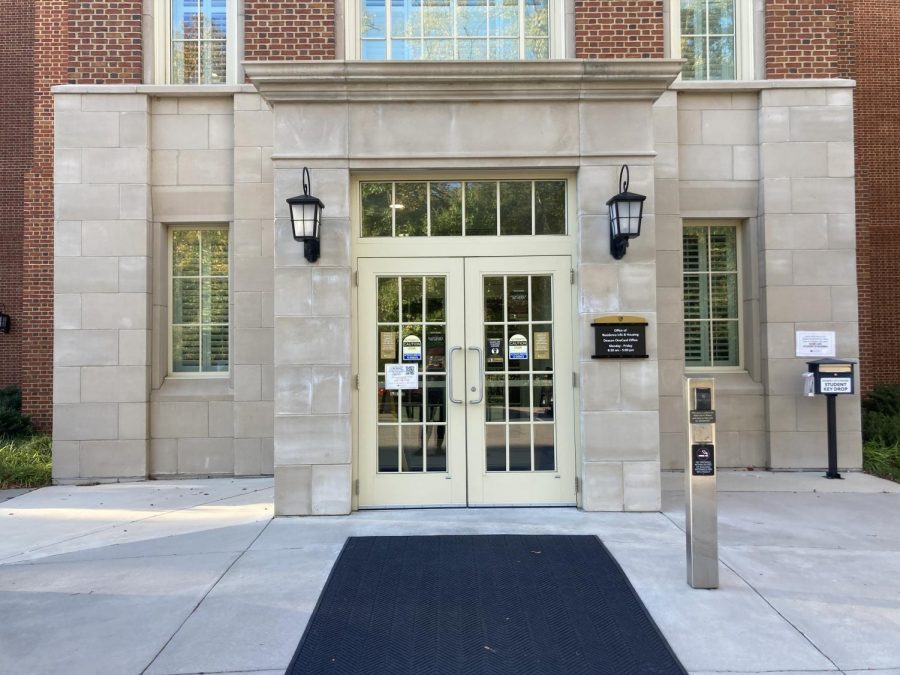University to provide winter break housing for international students
Chinese students still face obstacles in returning home
The Residence Life & Housing office is located in Angelou Hall.
November 2, 2022
The university plans to provide winter break housing for international students this winter break, according to Associate Director of Operations of Residential Life and Housing Zachary Blackmon. Many of Wake Forest’s 323 Chinese international students will choose to remain in the United States because of China’s COVID-19 quarantine policies.
Residence Life and Housing has not yet announced what kind of housing will be available or where. As details are solidified, the office will share an update with the student body.
Last year, Residence Life announced that the university would not provide housing during winter break on Oct. 4, 2021, causing frustration and dissatisfaction among international students since the pandemic continued to affect travel to different countries. After the Old Gold & Black published a report by Mingxuan Zhu, Dexter Peters and Elena Marsh highlighting the dilemma, Residence Life and Housing updated its winter break policy.
Winter break housing is a necessary accommodation for Chinese international students because traveling home to China is both costly and inconvenient because of quarantine policies still in place in China. China still requires a 14-day quarantine upon arrival in either a government-selected facility or a hotel at the traveler’s expense, making travel difficult and inconvenient for Chinese international students. Winter break is roughly four weeks long, and Chinese students have to spend half of that isolated from their families.
As the rest of the world lifts its COVID-19 policies to the point where it creates no restrictions on day-to-day life, China is still highly responsive to any sign of a COVID-19 outbreak due to the government’s zero-COVID policy. According to the National Health Commission of the People’s Republic of China, the number of new cases across 31 provinces was 521 on Oct 5. Only two of these were considered serious cases.
Chinese residents remain concerned about the spread of the virus. Sophomore Andrea Zhang, who already bought the ticket home for the upcoming winter break, is concerned about the discrimination she might face going back home.
“My dad is traveling for business all over the places in China,” Zhang said. “When he comes back, maybe the places he has gone [became places of high COVID-19 risk]. This [subjects him to] discriminat[ion]because people in our community will treat him as a threat.”
As of Nov.1, 2,889 areas in China have been categorized as “highly risky”, including many business districts and neighborhoods in major cities like Shenzhen and Guangzhou. In these high-risk areas, many restrictions are still in place. A negative COVID-19 test result within 24 hours is still required to use public transportation. Residents must also take two COVID-19 tests every three days, and sightseeing and mass gatherings have been prohibited.
“I planned to travel around when I went back,” sophomore Emily Liu said. “But I could not go to a lot of places because of the restrictions, and I feared that I would not be able to return to the school if I became a close contact of a virus carrier.”
In addition to the inconvenience of COVID-19 policies, cost also plays a factor in students’ decisions to stay.
Emily Liu paid an estimated $10,000 to travel home last summer. This amount included her flight, multiple COVID-19 tests, a seven-day hotel stay in Los Angeles and a 21-day hotel stay in China for quarantine. She would likely pay a similar amount to travel home for winter break.
On Aug. 25, 2022, a new health declaration form was released by the General Administration of Customs declaring the removal of COVID-19 tests for international arrivals. This is a silver lining for Chinese international students who wish to go home during the upcoming winter break.
“I think things will get better,” said junior Richard Zhang, who also bought a plane ticket to China in December.
Zhang’s primary concern now shifts to the transition from the break to the start of the spring semester.
“I expect to arrive at midnight before the first day of class,” Zhang said. “If there [was] a possible accommodation for students like me that can be implemented by Wake Forest, that [would] be great.”
Echo Liu agreed that the university should consider some flexibilities with its schedule and housing to meet the needs of its largest share of international students.
“I don’t feel like the university is giving enough attention to its international students in general,” said Echo Liu. “It is very important that the school should come up with some policies since we, as students, are unable to avoid certain time conflicts, and not every professor will understand us. We are entirely dependent on ourselves.”














